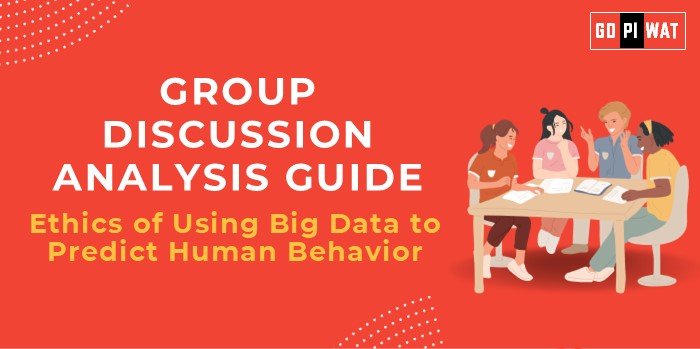📋 Group Discussion Analysis Guide: Ethics of Using Big Data to Predict Human Behavior
🌐 Introduction to the Topic
Opening Context: “Big data analytics has revolutionized industries, enabling unprecedented insights into human behavior, but it raises profound ethical concerns regarding privacy, consent, and societal impact.”
Topic Background: Predictive analytics relies on aggregating and analyzing large datasets to forecast behaviors, preferences, or actions. From targeted advertising to public health interventions, this capability demonstrates potential for positive change, yet challenges societal norms and individual autonomy.
📊 Quick Facts and Key Statistics
- 🌍 Global Big Data Market Size: $273 billion by 2026 – Reflects its economic influence and ubiquity.
- 🔒 Data Privacy Concerns: 80% of consumers worry about how companies use their data (Pew Research, 2023).
- ⚖️ Algorithmic Bias: Studies indicate a 25% higher error rate in predictive policing models for minority communities.
- 📜 Legislation: Only 43% of countries have comprehensive data protection laws (UNCTAD, 2023).
🤝 Stakeholders and Their Roles
- 🏛️ Governments: Regulate data use and protect citizen rights.
- 🏢 Corporations: Develop and utilize big data technologies for profit and service optimization.
- 🎓 Academics: Research ethical frameworks and unintended consequences.
- 👥 Citizens: Provide data, often unknowingly, and face consequences of its use.
🏆 Achievements and Challenges
✨ Achievements
- 🏥 Healthcare Advancements: Predictive models have improved diagnosis accuracy and epidemic control.
- 📈 Marketing Personalization: Enhances consumer experience while increasing efficiency for businesses.
- 👮♂️ Public Safety: Crime prevention through predictive policing, albeit controversial.
⚠️ Challenges
- 🔍 Privacy Violations: Intrusive data collection without explicit consent.
- ⚖️ Bias in Algorithms: Models often amplify societal inequalities.
- 📜 Regulatory Gaps: Inadequate legal frameworks lead to exploitation.
🌍 Global Comparisons
Success: GDPR in Europe sets a benchmark for data privacy.
Challenges: The Cambridge Analytica scandal highlights misuse in democratic contexts.
📚 Case Study
India’s Aadhaar System: Mixed reviews for data security vs. accessibility benefits.
📄 Structured Arguments for Discussion
- ✅ Supporting Stance: “Big data’s predictive power can revolutionize healthcare and public safety when ethically implemented.”
- ❌ Opposing Stance: “The potential for misuse outweighs the benefits, as evidenced by pervasive privacy violations.”
- ⚖️ Balanced Perspective: “While transformative, big data’s predictive use demands stricter oversight to mitigate risks.”
🎯 Effective Discussion Approaches
- Opening Techniques:
- 🤔 Start with an ethical dilemma: “Imagine being denied a loan based on an algorithm’s prediction of your future actions.”
- 📊 Use impactful data: “80% of internet users feel their data is not adequately protected.”
- Counter-Argument Handling:
- 🛠️ Respond with balanced insights: “While predictive analytics risks bias, transparency in algorithm design can mitigate these issues.”
📊 SWOT Analysis
- 💪 Strengths: Transformative societal benefits, economic growth.
- 📉 Weaknesses: Privacy concerns, algorithmic bias.
- 🚀 Opportunities: Ethical AI, global collaborations.
- ⚡ Threats: Data breaches, legal challenges.
📈 Connecting with B-School Applications
- 🌐 Real-World Applications: Ethical AI in marketing, risk assessment in finance, and healthcare solutions.
- 🗣️ Sample Interview Questions:
- 💬 “What ethical considerations should guide big data use in public health?”
- 🔑 “How can businesses balance profit and privacy in predictive analytics?”
- 🎓 Insights for B-School Students: Explore courses on ethical AI and privacy law; integrate frameworks into internships.


